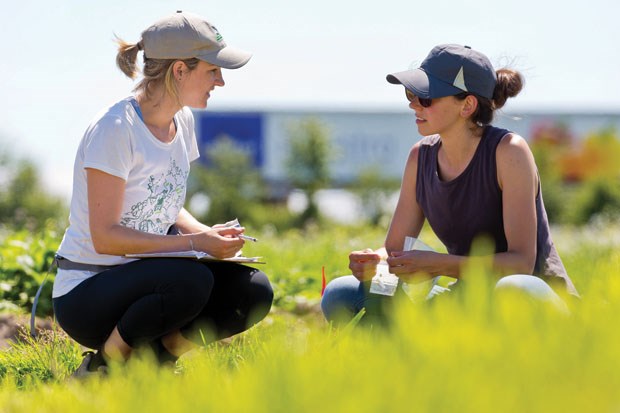A UBC research study is creating a lot of buzz within the Delta Farmland and Wildlife Trust's Hedgerow Stewardship Program.
Martina Clausen is leading a team of volunteers in their second summer of research to identify which wild bee species live in Delta's farmlands and which habitat supports bees best.
"Within the past decade we have seen the bee population declining - not just honey bees, but also wild bees," Clausen said. "People seem to be very aware of the honey bee colony collapse, but not that many people know about wild bees, how many wild bee species there are and what importance wild bees play to human food production. Hopefully we can find out about the plants that support wild bees and can counteract their decline."
With the addition of four new sites identified this summer by the trust, Clausen and her team are now collecting data from eight sites.
"The primary objective of this study is to develop a set of basic data for a comparison between each of these three semi-natural habitats (planted hedgerows, remnant hedgerows and grass margins) that will enable a better understanding of their capability to support bee populations by providing floral resources," Clausen said.
By mid-August, Clausen plans to wrap up the research and begin analyzing the data, which she expects will take her until the end of the year. She will then write her thesis and defend her thesis in early spring of next year.
Clausen moved to Vancouver from Switzerland with a bachelor's degree in environmental engineering and a vague idea of pursuing research in the field of agriculture and biodiversity.
When she started her graduate studies at UBC with the sustainable agricultural landscapes lab in January, she knew very little about bees. Luckily the UBC lab had been successfully collaborating with the trust on several projects, so she became familiar with their work.
When she began her research little was known about the status and effect of hedgerow conservation efforts on local bee communities.
"Long-term monitoring of pollinators is urgently required to provide information on status and trends for most species," she said.
Christine Terpsma, the trust's program coordinator, said Clausen's work might help the organization boost the pollinator carrying capacity of local farmland hedgerows, which is very exciting.
"Farmers have planted native trees and shrubs within the Delta Farmland and Wildlife Trust's Hedgerow Stewardship Program for over 20 years," said Terpsma.
"In the past we've evaluated many habitat elements and benefits provided by our hedgerows, including bird species inventories and soil carbon storage. Martina's work will assist our organization in refining the management of the program in order to increase native pollinator benefits. If we know what type of pollinators are currently using agricultural hedgerows and which plant species they prefer, we can tailor our plant list for future projects."
Clausen said sharing her findings with the public has been very enjoyable.
"Most people are surprised when they see how diverse and incredibly beautiful bees can be," she said.
"I hope as people become aware of those other pollinators and the important work they're doing, this will be a first step in people's appreciation and willingness to help protect those little creatures."



